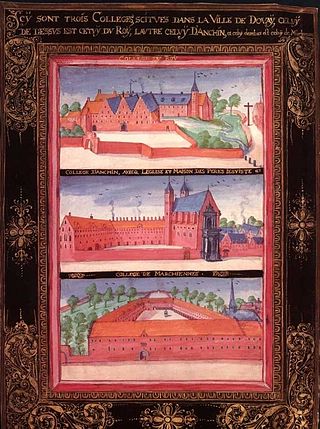Related Research Articles

William Allen, also known as Guilielmus Alanus or Gulielmus Alanus, was an English Cardinal of the Roman Catholic Church. He was an ordained priest, but was never a bishop. His main role was setting up colleges to train English missionary priests with the mission of returning secretly to England to keep Roman Catholicism alive there. Allen assisted in the planning of the Spanish Armada's attempted invasion of England in 1588. It failed badly, but if it had succeeded he would probably have been made Archbishop of Canterbury and Lord Chancellor. The Douai-Rheims Bible, a complete translation into English from Latin, was printed under Allen's orders. His activities were part of the Counter Reformation, but they led to an intense response in England and in Ireland. He advised and recommended Pope Pius V to pronounce Elizabeth I deposed. After the Pope declared her excommunicated and deposed, Elizabeth intensified the persecution of her Roman Catholic religious opponents.

The University of Douai is a former university in Douai, France. With a medieval heritage of scholarly activities in Douai, the university was established in 1559 and lectures started in 1562. It closed from 1795 to 1808. In 1887, it was transferred as University of Lille 27 km away from Douai.
Richard Bristow was an English Catholic controversialist and Biblical scholar.
Thomas Worthington, D.D. was an English Catholic priest and third President of Douai College.

Henry Heath (1599–1643), religious name Paul of St. Magdalene, was an English priest of the Order of Friars Minor and a Roman Catholic martyr.

Thomas Stapleton was an English Catholic priest and controversialist.

The Reverend Father Gregory Martin was an English Catholic priest, a noted scholar of his time, academic and Doctor of Divinity, and served as the chief translator of the Rheims and Douai Version of the Bible, the first full, official Catholic English Bible translation, translated from the Latin Vulgate.
John Fowler was a Catholic scholar and printer.
Richard Gibbons was an English Jesuit scholar.
Thomas Dorman was an English Catholic theologian.

Thomas Harding was an English Roman Catholic priest and controversialist. He was one of the Worthies of Devon of the biographer John Prince (d.1723).
John Fenn was an English Roman Catholic priest and writer, in exile under Elizabeth I of England. He was the elder brother of James Fenn, the Catholic martyr, and Robert Fenn.
Gabriel Gifford OSB was an English Roman Catholic Benedictine monk who became Archbishop of Reims.
William Clifford was an English Roman Catholic theologian.
William Reynolds was an English Roman Catholic theologian and Biblical scholar.
George Leyburn was an English Catholic priest, who became President of the English College, Douai.
Thomas Hyde (1524–1597), was an English Roman Catholic academic, teacher, priest and exile.
Richard Marshall D.D. was an English clergyman and academic administrator at the University of Oxford.
Owen Lewis, also known as Lewis Owen was a Welsh Roman Catholic priest, jurist, administrator and diplomat, who became Bishop of Cassano all'Jonio.
Morgan Phillips was a Welsh Roman Catholic priest and a benefactor of Douai College.
References
- Attribution
 This article incorporates text from a publication now in the public domain : Cooper, Thompson (1893). "Martiall, John". In Lee, Sidney (ed.). Dictionary of National Biography . Vol. 36. London: Smith, Elder & Co.
This article incorporates text from a publication now in the public domain : Cooper, Thompson (1893). "Martiall, John". In Lee, Sidney (ed.). Dictionary of National Biography . Vol. 36. London: Smith, Elder & Co. This article incorporates text from a publication now in the public domain : Herbermann, Charles, ed. (1913). "John Martiall". Catholic Encyclopedia . New York: Robert Appleton Company. The entry cites:
This article incorporates text from a publication now in the public domain : Herbermann, Charles, ed. (1913). "John Martiall". Catholic Encyclopedia . New York: Robert Appleton Company. The entry cites: - Thompson Cooper in Dictionary of National Biography , s. v.
- Joseph Gillow, Bibl. Dict. Eng. Cath., s. v.
- T. F. Knox, Historical Introduction to Douay Diaries
- Anthony à Wood, Athenæ Oxon., ed. Bliss, I, 658
- Charles Dodd, Church Hist., II, 113
- John Pitts, De illust. Ang. script.
- A. Haudecoeur, Histoire du Collège Anglais à Douai (Reims, 1898)
- Bede Camm, Life of Allen (London, 1908)